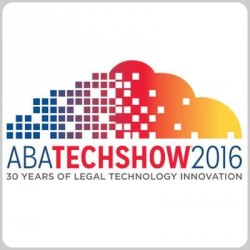ABA Techshow enters its 30th year highlighting legal technology

“Computers were something that only secretaries had back then,” Cohn says. “Nowadays, almost all lawyers have computers on their desks, and the ones who don’t probably have one in their pockets.”
Cohn will be the keynote speaker at ABA Techshow 2016, taking place March 16-19 at the Chicago Hilton. “The first Techshow came on the heels of paralegals being introduced into the ABA as associate members, which was very controversial,” says Jeff Aresty, a Massachusetts business and e-commerce attorney who leads the nonprofit Internet Bar Organization. “All of a sudden, that opened up a big door and created a real connection between lawyers, paralegals and computers as the actual production of documents became front-and-center.”
Aresty, along with two Texas-based lawyers, Don Hagans and Bruce Jaster, were inspired upon seeing the massive, multimillion-dollar Infomart building in Dallas. Back then, Infomart served as a permanent trade show for tech vendors, and the three attorneys wondered whether something like that could be adapted for lawyers.
They formed Techshow and held two events in 1987, in Dallas and Boston. Chicago became the permanent home of Techshow beginning with the 1989 show. Since then, innovations in technology have fundamentally changed the practice of law. For instance, it used to be easy keeping client information secure. But moving from a lockable file cabinet to electronic storage in the cloud has made cybersecurity and privacy essential issues for lawyers.
On March 18, Cohn is expected to address these issues. A plenary session will deal with mass surveillance.
“The Fourth Amendment is based on the presumption that people keep their most important documents and papers in their homes,” Cohn says. “Nowadays we live in a world where most people give their documents to a third party, like the cloud or email. That creates a profound need to think about what we want the Fourth Amendment to mean in this digital age.”
Cohn argues that the government has already decided this information is not private, and she plans to devote much of her address to talking about what lawyers can do to keep client information secure.
“This is especially important to lawyers,” says Cohn, who is currently litigating cases against the National Security Agency and the Federal Bureau of Investigation. “You can’t say you care about attorney-client privilege and then not protect your communications.”
Other Techshow sessions will remain consistent with previous iterations of the event. There will be introductory tracks where lawyers can learn basic technological skills for Microsoft Office or getting the most out of your Mac. Other sessions include how to market your firm, use the cloud or manage your practice.
As Aresty points out, automation was a major theme of the first Techshow, and it has continued to be an important feature ever since. This year there will be an entire track called “The Productive and Efficient Lawyer” that will deal with issues such as running a paperless office and using “robot lawyers” to boost your firm’s efficiency.
“The idea in 1987 was that Techshow was an agent of change and that we were out there to make access to justice much easier by making the job of lawyers much easier,” says Aresty. “I think that change is something that is built into the fabric of Techshow. The question is how the profession as a whole deals with it.”
This article originally appeared in the March 2016 issue of the ABA Journal with this headline: “Showtime: ABA showcase enters its 30th year highlighting legal technology.”



